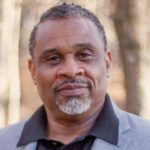*Editor’s Note: This is part 3 of 3 of an honest conversation about race between 3 friends: Dr. Michael Patterson, Angel Maldonado, and Jim Lenahan. All three are ministers. The conversation took place on Sunday, June 7, at The Path Church in Atlanta, GA. Here is Part 1 and Part 2.
MIKE: I really was having a rough time transitioning to Atlanta. I had lived in New York and I had gotten used to saying what was on my mind. One day in Atlanta, I was home and I get this phone call from someone from church. I had never had a conversation with him before. After we talked for about 15 minutes, he said, “Are you from New York?” I told him I had worked there. He said,
“Well, just a little bit of advice: Now that you’ve moved back to the South, you need to speak differently to older white men.”
I was stunned. It wasn’t older men. It was older white men. I thought, So that’s how we’re going to do this. So I was having these back-to-back racial tensions, but most of my white friends thought I was just imagining things.
And that leads up to my encounter with my fellow Georgia minister Jim Lenahan.
JIM: I’ll just apologize ahead of time. But to me, I thought you were the stereotypical black man that I used to think about in my mind. Like, he’s angry and really unhappy. It’s good to hear where you were coming from—I didn’t know it at the time.
I love meeting with other ministers. I think it’s one of the greatest things going because we understand what we’re going through and there’s this camaraderie. I love the fellowship. But when I came as a minister to Georgia, I realized, wow, there are some serious problems down here.
There were definitely racial tensions.
Interestingly, it was 36 years after I had rocks thrown at me on MLK day, we ministers were at the MLK museum. We were told to pair up. I knew Mike was a history buff, and, frankly, black history was not taught in my school. So I was ignorant; I knew hardly anything about MLK or the Civil Rights Movement. So I wanted to learn, but I was also a little scared of Mike.
But I’ve got to tell you, it was one of the greatest, most transformative days of my life when I met you, Mike.
And I got to hear for the first time ever the other side of the story. I had always been taught the white side of the story, and to hear the other side and to sense the pain that was within you broke my heart.
And that was when I decided I had to do something different. I could no longer just not be racist. I wanted to join the fight and fight against racism. I also decided I’m going to become a close friend of Mike Patterson.
MIKE: Since we’re confessing, I’ll add that when Jim Lenahan comes over, my first thought was, Here comes another bossy white dude. I really didn’t want to be bothered, but, you know, we were there. So I could at least try to be like Jesus.
Honestly, though, that time together transformed me too. I see there’s a pattern in my life. Whenever I’m getting to the place where I’m about to write white people off, God sends a random white person who breaks the stereotype. I was at a place where I thought I can’t deal with these preachers, especially these white preachers. I’m done. And then you came along.
What I appreciate so much is that you listened.
You didn’t say, “No, that’s not it. That didn’t happen.” You didn’t dismiss what I was saying. You just listened. And after just pouring out my heart, I said to myself, You know what? I think I’ll be all right. I think we can work this out. Because I felt like for the first time there was an honest dialogue.
It wasn’t, “Hey, we’re the church, and we’re amazing. We have no problems.” No, it was, “We’ve got problems and we can work toward fixing those problems.” So I just want to thank you, Jim. I appreciate it, brother.
JIM: Honestly, I tell a lot of people, our friendship was one of the greatest blessings that ever happened to me as a minister and as a man. I’m different because of you. I look up to you as a mentor, somebody who’s trying to help me and be patient with me and guide me and lead me.
MIKE: I can’t even begin to describe what you mean to me personally, my family, and the ministry. You know, my older brother passed in 2015 of pancreatic cancer. He was a year older than me. When he passed, that’s when I said, you know, life is short. How am I going to spend the rest of my time? The most precious commodity I have are the hours, days, months I have left on this planet. How do I want to spend it?
And I don’t want to spend it angry and bitter and resentful. I want to build relationships with people where it’s mutually respectful. Because time is short.
ANGEL: One of the things I love about you, Jim, is your heart for justice. I got to see that clearly in a small way, when my family and I were hanging out with you one Sunday. We went out after church and we had lunch. I think it was at Whole Foods. We came back out, and our car was booted. Ours was the only car that was booted.
And Jim was upset because he knew the reason. They must have thought we were parking there just to go to some other store or whatever. And it was great because Jim said, we are not standing for this. He said, “Who put this boot on? I want to know. Why did you single out this family?”
Jim, you made sure that you used your influence in that moment for us. And that is so much of what we’re asking white America to do for us at this time.
It’s to acknowledge that there is privilege, and it’s not a bad thing in and of itself. But what God tells us to do is to use that for the good—not to get farther ahead and leave others behind. I got to see that you are passionate about justice and you’re bold.
Jim, What would you like to say to other white brothers and sisters, especially white ministers? What would you like to tell them during this time?
JIM: I have a long way to go. So I don’t speak from any position of advantage here to other white men. But I know what’s helped me.
First, stop feeling that you have to defend yourself or your race. That’s not who is being attacked.
Second, do your own research. There are so many great resources for hearing the other side of the story regarding the Civil Rights Movement. Listen to the other side—even exclusively for a while—and just drop the defensiveness.
Third, confess your sins. I think it could reveal a lot of sin. A lot of blindness.
Another thing I would say is to find somebody like Mike Patterson. Mike didn’t wait for me to come up with the perfect response or perfect sermon or perfect presentation. He gave me the grace to say, “Bro, let me help you with that. That’s not the best way of saying that.”
Especially to pastors, I might add—and I mean this in the nicest way possible—worry more about the salvation of souls than your job. There are going to be people who don’t like it when you speak up.
ANGEL: Mike, how have you been feeling during this time, and what would you tell your black brothers and sisters, ministers, and people in authority?
MIKE: There are so many brothers and sisters in our congregation who have been struggling. So when when part of the body hurts, we all hurt. What I would like to do though is try to come up with solutions more than anger and rants.
Being angry and frustrated won’t fix it. I tried it; it won’t fix it.
The only thing that happens is you get bitter and start being resentful. And the Bible says that’s a sin. Don’t waste your time fighting. Instead, find people who want to engage in conversation. Find white men and white women who want to be honest. That made all the difference in me.
I would say we can’t fix racism with legislation. We can’t fix it on a macro level. It’s gotta be micro—person to person. I think honest conversation is a step to helping other people.
A Scripture that helps me during this time has been Revelation 7:9: In the end God wins, and He says all nations, tribes, and languages will be standing in front of the throne. I know we will get through this. It’s hard right now. But I believe that God will allow us to win in the end.












